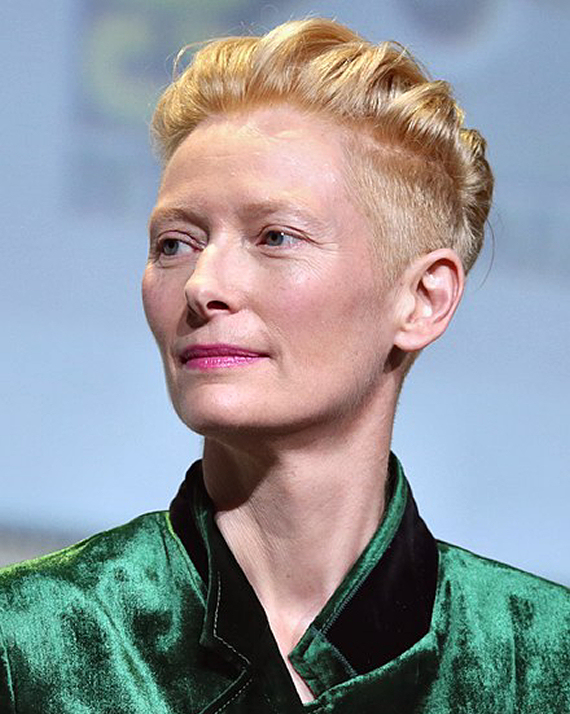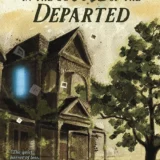
I probably saw her in something else previous, like Broken Flowers, with Bill Murray, but I first really noticed Tilda Swinton in the fan-spurned movie Constantine (2005), with Keanu Reeves, where she played the angel Gabriel. I really noticed her in the non-genre movie Michael Clayton (2007), with George Clooney and Tom Wilkinson, where her performance was so good—her climactic scene, where her character almost literally dissolved emotionally, was so powerful that she won an Academy Award. She’s played both major and minor roles in genre films: The Ancient One in several Marvel movies, like Doctor Strange; the White Witch/Ice Queen in the Narnia movies; Eve in Only Lovers Left Alive with Tom Hiddleston et al.; the aforementioned Constantine; Mason in Snowpiercer; several minor roles such as in Benjamin Button and The Dead Don’t Die; and now her genre star turn as Alithea Binnie in Three Thousand Years of Longing (2022), with co-star Idris Elba.
Tilda Swinton is British, about 62 years old and (for those who care) apparently, non-binary. She’s won awards in both Britain and the U.S. and has been nominated for many more. She’s not classically beautiful—in fact, somewhat androgynous, as shown in her portrait of the angel Gabriel in Constantine; after all, angels have no gender, from what I understand. Despite the fan reaction—“it’s nothing like the comic! Keanu can’t act! He doesn’t even look like the comic! …and so on”—the film remains for me one of my top genre films. The special effects (like Hell’s eternally burning Los Angeles) were top-notch; Keanu’s non-acting style worked for the film’s John Constantine, though not, as noted, much like the guy in Hellblazer; and standout performances by Tilda, Reeves, Rachel Weisz, Peter Stormare (as the Devil) and even a non-annoying performance by Shia LeBoeuf (one of the few, IMO).
You can, of course, look up (if you have a streaming service) any or all of the aforementioned films and decide if I’m right—but in my opinion, she’s one of the best actors on film today. One reason I mention Constantine in this review, besides that I think it’s a terrific movie, is her performance. Like most of the angels (and I don’t believe in all that stuff, myself) in the TV series Lucifer, she’s aware of her power and supremely contemptuous of humans. She thinks she knows better than her boss (God) how to make humans do what she thinks he wants. She thinks that, as an archangel and one who speaks for God, she can even banish the devil when he appears. An excellent performance all the way.
Even though she’s a plain, not terribly “feminine” appearing person, she brings reality and gravitas to her roles, as in the movie Burn After Reading (also non-genre, but terrifically funny), where she plays the wife of CIA agent Osborne Cox (John Malkovich), who’s secretly having an affair with George Clooney’s bed-hopping character (Swinton’s having the affair, not Malkovich). If you are inclined to laugh your head off and don’t mind a mainstream/mundane movie, this one also has J.K. Simmons, Brad Pitt, Frances McDormand, Richard Jenkins, and a cameo by Big Bang Theory’s Kevin Sussman (Stuart, the comic shop owner in BBT). It’s also directed by Joel and Ethan Coen. Tilda’s a “cold-hearted bitch” in this one, and also a very controlling person (I’m quoting one of the characters).

The new movie, based on a short story, “The Djinn in the Nightingale’s Eye,” by A.S. Byatt, may well be a classic. George Miller, better known for the Mad Max movies, or The Witches of Eastwick (great Jack Nicholson performance!) perhaps, unless it’s for films like Babe or Happy Feet, has reportedly wanted to make this movie for years. It’s an interesting one, with no real plot in the usual sense, and no real ending—no spoilers, but you’ll know it when you don’t see it. I think perhaps it will fit in the “fairytale” category when all is said and done.
Alithea (Tilda) is a globe-hopping “narratist,” I think she’d call it. She’s got a Ph.D. in narratology, if I remember correctly, which is about storytelling. She knows practically every story—myth and fairytale—out of every land, and speaks Greek and perhaps French, German and Spanish, as well as English—but not Turkish; she is unmarried (divorced, and she keeps her ex-husband’s things in a box on a shelf) with no children. She likes her life and has no great ambitions or desires. She’s thin, has natural orange-coloured hair, needs glasses, and wears plain clothing and long dresses. She has a regional British accent, maybe Scouse (I couldn’t tell), rather than a BBC one. She gives lectures on storytelling; it’s so much a part of her life that she occasionally spaces out and sees imaginary things.
On a trip to Istanbul (not Constantinople!—Dr. Demento fans will remember that one), she is given the room in her hotel where Agatha Christie wrote Murder on the Orient Express. It’s a throwaway and has nothing to do with this story, btw. During her lecture, she sees things—demons?—in the audience; and afterward, her co-presenter takes her to the bazaar where he offers her a souvenir. She chooses a striped glass bottle that has been damaged in a fire, despite his protestations, and takes it back to her hotel room. Later, cleaning the bottle, she accidentally knocks the stopper out, and a bunch of coloured smoke comes out and coalesces into a giant Djinn, or genie (Idris Elba). They establish a mutual language (Greek) and he manages to shrink to only really big compared to her rather than room-filling size. He learns English by sucking data out of the TV and her laptop, and they begin to converse.
And here I must stop with the description, as I’m sure most of you would want to find this out for themselves. What I can do is ask you a few questions: if you were granted three wishes, what would you ask for? What if you were a single, older woman, who doesn’t really have any “heart’s desires,” and is comparatively happy with her status and place in the world? What if you were a Djinn who had been exiled to bottles and forced to live in your own mind for three thousand years? I can’t help remembering the story about the genie who said “For the first thousand years, I promised to reward whomever released me with his (or her) heart’s desire, to make him a king, fabulously wealthy; and when nobody came, for the next thousand years I decided I would kill whomever released me in revenge for all that time spent in the bottle.” (I can’t remember how he finally decided.)
Anyhow, what I can tell you is that the Djinn told Alithea his story in a series of storybook flashbacks—not meant for children, btw; this is not a kids’ movie—while she tried to decide whether she had any desire or need for those kinds of wishes.
It was a good, gentle (in spite of a lot of violence in the Djinn’s stories) kind of movie, and I think both Tilda and Idris did a good job. We’ve come to a point where moviemakers can put anything you can imagine on the screen, so the flashbacks’ special effects were seamless. I recommend this one.
You can comment, if you wish to comment, here or on Facebook, or even by email (stevefah at hotmail dot com). All comments are welcome! (Just be polite, please.) My opinion is, as always, my own, and doesn’t necessarily reflect the views of Amazing Stories or its owner, editor, publisher or other columnists. See you next time!
Steve has been an active fan since the 1970s, when he founded the Palouse Empire Science Fiction Association and the more-or-less late MosCon in Pullman, WA and Moscow, ID, though he started reading SF/F in the early-to-mid 1950s, when he was just a sprat. He moved to Canada in 1985 and quickly became involved with Canadian cons, including ConText (’89 and ’81) and VCON. He’s published a couple of books and a number of short stories, and has collaborated with his two-time Aurora-winning wife Lynne Taylor Fahnestalk on a number of art projects. As of this writing he’s the proofreader for R. Graeme Cameron’s Polar Borealis and Polar Starlight publications. He’s been writing for Amazing Stories off and on since the early 1980s. His column can be found on Amazing Stories most Fridays.










Recent Comments